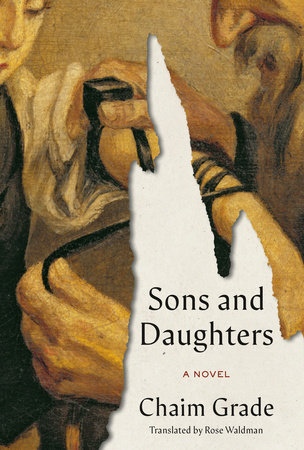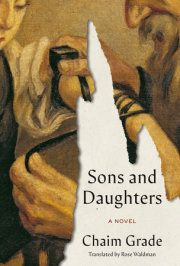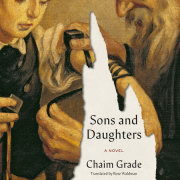“A great beard novel . . . Also a great food novel . . . A melancholy book that also happens to be hopelessly, miraculously, unremittingly funny . . . [Grade’s] fretful characters vibrate as if they were drawn by Roz Chast. Nearly everyone is about to smack someone . . . Grade has so many gifts as a writer. Like a rabbi, he is a distributor of beneficence . . . he has folk wit as well as intellect . . . he can write about a hairy little soul with as much sensitivity as a great one. He is a custodian of traditions, yet in close, chafing contact with this flippant world . . . Rose Waldman’s translation of Sons and Daughters seems miraculous to me. The language is crisp and clean; it is also bright, like a painting that has been restored.” —Dwight Garner, The New York Times
“A towering achievement. . . . [Grade] can write in many registers, from the comic to the elegiac, and his facility with dialogue . . . surpasses that of Saul Bellow or Philip Roth. . . . Perhaps Grade’s greatest gift is his capacity to relay in dialogue or expository prose complex, abstract ideas about Jewishness, the paradoxical behavior of God, depression, and Nietzsche.” —Daphne Merkin, New York Review of Books
“[Grade’s] ambition is biblical. I don’t think the word overreaches. . . . The risk writers run when they set out to memorialize is that they’ll produce memorials, not literature. Grade didn’t do that. His novels jam almost too much life into their pages. That’s not a criticism, because the streets of prewar Jewish Eastern Europe also jostled and overflowed; Grade’s prose mimetically reproduces the way Jews thronged in their tight quarters. His major accomplishment, though, is at the level of the individual characters. They’re vortices of ambivalence, anxious and raw and at odds with themselves, hypercritical yet hypersensitive, repressed but not undersexed, subject to delusions of grandeur or abasement or both in turns. On the whole, they’re good people. They scheme and bicker and get on one another’s nerves, and yet they have deep family feeling, and few of his protagonists wholly free themselves from a yearning for contact with the divine. The dominant emotion in a Grade novel is tortured loyalty.” —Judith Shulevitz, The Atlantic
“An epic, an elegy, as unfinished as the Jews, and one of the world’s great books.” —Joshua Cohen, author of The Netanyahus
“When millions of Yiddish-speaking Eastern European Jews perished in the Holocaust, their stories, culture and way of life were wiped out with them. One survivor, the novelist Chaim Grade, made it his life’s mission to keep their memory alive. . . . Now that [Sons and Daughters] is available in this superb translation by Rose Waldman, it can appeal to a new and universal audience. For those who would like a vivid picture of pre-war Jewish life in Europe; who appreciate a brilliant recreation of generational conflict in Jewish families, or who may be struggling with their own questions of faith, Grade’s novel may truly resonate. Though the Holocaust itself is never mentioned in the book, it is felt on every page. In some sense, Sons and Daughters can be considered a Holocaust memorial, as the events it describes foreshadow the upcoming annihilation of Polish Jewry. It is this tragic awareness that animates Grade’s questioning and demand for answers from the rabbinic establishment, from the Torah, and from God himself.” —Yossi Newfield, Forward
“Every character matters in Sons and Daughters; each is given their own moment to grapple with a society rife with poverty, war, isolation, and loss of faith. [Their] interconnected stories weave a complicated tapestry of arguments and friendships and unspoken confessions.” —Isadora Kianovsky, Jewish Book Council
“[A] richly textured family saga. . . . The novel never loses its focus on powerful, complex psychological forces within the Jewish family. . . . A joint effort between a resourceful, innovative translator and a masterful Yiddish novelist who ran out of time. . . . Waldman captures the charm of Grade’s descriptions as well as the pith of his wit. At the same time, her translation reflects the spirit of cultural revival. . . . The portal this novel opens into the past gives us a world of such vividness, it may help us find our way.” —Julian Levinson, Jewish Review of Books
“A towering work, a loving lament for the shtetl life of 1920s and ’30s Eastern Europe and a heartrending chronicle of generational schism, [in] an inviting and vigorous translation.” —Sam Sacks, Wall Street Journal
“The depiction of Shabse-Shepsel’s marriage must be one of the greatest bad marriages in world literature.” —Eugene Stein, Forward
“A great Yiddish novelist’s grimly foreboding and fiercely alive final work. . . . In sustaining his densely detailed, closed-in, slowly advancing narrative over 700 pages, Grade embraces modernism on an epic scale . . . This long-awaited novel is a monumental achievement.” —Kirkus (starred review)
“An enormous achievement. . . . Grade, who died in 1982, never alludes to the Holocaust, but its weight informs his elegiac portrait of a bygone life, in which each chapter feels like a fully realized story and the many characters are depicted in compassionate detail.” —Publisher’s Weekly (starred review)






